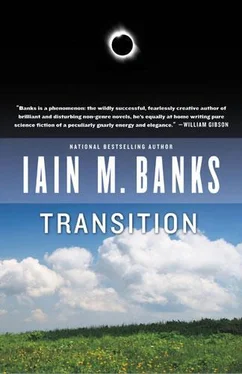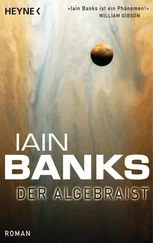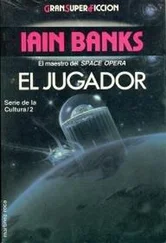“And did it?”
“After a fashion. It was more thorough and wide-ranging than just that, though. The full programme was aimed at establishing what randomisers were capable of, removing the myths and superstitions associated with their weird-shit powers and giving the field a proper scientific grounding, but septus-free transitioning was the pinnacle, the platinum-standard goal we were never likely to achieve but should never quite lose sight of, either.”
“What did it involve?”
“Torture,” she said, fixing her gaze on me for a moment. “In time, it involved torture.” She looked back at the gaming table as the chips we’d placed were raked away. She reached out, placed another on the same square. I placed some of mine nearby. “The randomisers ranged from the cretinous through the educationally subnormal and the socially awkward to the odd disturbed genius. Initially it was harmless. We were convinced we were helping these misfit people. And it was fascinating, enthralling; it was a privilege to be spending a vacation researching something that was almost certainly impossible but which would be simply astounding if it proved to be a viable technique, the sort of breakthrough that resounds across the many worlds and down the centuries, the kind of achievement that means your name is known for evermore. Even if it proved to be an entirely mythical talent – as we suspected – we were finding out lots of stuff. It was the single most exciting time of my life. When the autumn came and I was supposed to resume work at UPT, I volunteered to take a year’s special leave so that I could stay on at the facility and keep working on the problem. Madame d’O herself smoothed away any problems the faculty might have offered. For most people, that was when I disappeared.” She looked at me. “I’m sorry I never did say goodbye to you, not properly. I thought I would see you at the start of the new term, then… well, I’m sorry.” She looked away again.
Quite. I had no intention of telling her how much I had missed her throughout all these years, or that I had felt, at the time, as though my heart had been broken, or that I became a different person thereafter, and became so specifically because of that abrupt abandonment, turning from a prospective career in academia or research to the training required to become a transitionary, an operative, an agent; eventually, an assassin. It would only have sounded maudlin, and what good would it have done?
“I think,” she continued, “Theodora mistook my fascination with the theoretical side of the research for outright zeal, a shared passion.” She glanced at me and a smile, soon gone, flickered across her face. She stared at the chip on the table again. It was scraped away too and she replaced it with another.
“It was during that year, after the people who’d just been there for the vacation had gone back to their studies, that we started to make real progress. Just the hard core were left. We had our own septus techs on the staff, seconded from wherever they actually formulate the stuff; experts in its manufacture, use and side effects. That was a privilege in itself; you never get to meet these people. Did you know there are trace elements put into septus to make transitioners easier to track?” She glanced at me, long enough to see my eyes widen. “Trackers would have a much more difficult job if those trace elements weren’t present. They would have to rely on something like pure instinct. As it is, with the elements there in every standard dose of septus, it’s as though they see a puff of smoke left behind where somebody has just transitioned, and can follow a faint line of that discharge to the next embodiment.”
“Seriously?” I asked.
“Absolutely seriously.” Mrs Mulverhill nodded slowly, still staring at the gaming table. “And Madame d’Ortolan was absolutely serious about what we were doing, too. She spent a lot of time at the facility, directing our research, guiding our enquiries, even helping to refine some of the abstract, speculative stuff. I spent a few evenings doing nothing but talk with her about transitioning theory. She has quite a fine mind, for a psychopath. At the time, I didn’t know that was possible. However, she was… overenthusiastic. Wanting what she did so much, she took risks, cut corners, overextended herself. She let transitioners and trackers and septus chemists get together properly for the first time in centuries, and some of us learned things we were never supposed to know.”
“Like the trace-elements thing.”
“Like the trace-elements thing.” She nodded again. “I think she assumed my hunger to know was directed solely at the problem in hand: finding out what the randomisers were really capable of and grasping after septus-free flitting. I don’t think it occurred to her that I might just have a general urge to find out all I could about everything, especially whatever was being kept purposefully hidden.”
More of our chips had disappeared. Some people left the table, to be replaced by others. Mrs M put another chip on the same square. I placed mine on the square next to hers. “The randomisers were troublesome. Socially inept, highly neurotic, riddled with problems and often medically challenged. Continence seemed to be a particular problem. It was possible to grow to despise them, certainly to dismiss them, to forget their humanity. One began to feel that they kept their secrets locked away inside them deliberately, just to spite us. We were encouraged never to fraternise, to treat them as experimental subjects, in the name of objectivity. They were broken, mostly useless people; a threat to themselves as well as society. We were doing them a favour, almost ennobling them, by containing their awkward, undisciplined powers and giving them a purpose, making them a part of a programme which would benefit everybody.
“We began to stress them. It was quite easy to do. They were like uncooperative children: wilful, perverse, often knowingly obstructive, sometimes aggressive. Stressing them – severely rationing their food and water, depriving them of sleep, giving them impossible puzzles while they were forced to listen to painfully intense noise – felt like a necessary discipline, like a sort of small collateral punishment they had already asked for, yet at the same time it seemed perfectly excusable because it was for research, for science, for progress and the good of all, and we weren’t enjoying it; in fact we suffered maybe as much as they did because we knew more fully what we were doing. They were something like brutes while we were properly functioning human beings: educated, cultured, sensitive. Only the best could be asked to do the worst, as Madame d’Ortolan liked to say.
“When I went to Theodora with some misgivings, after watching what was basically a torture session when a man strapped to a bed was injected with a mixture of psychotropic drugs and corrosive chemicals, she told me about the menace we were all facing. She’d convinced herself that the Concern and every world it could reach was under some terrible threat from outside, that there was some diabolic force forever pressing at its boundaries – wherever they were supposed to be – and we had to prepare ourselves for onslaught. I pressed as much as I thought I could get away with to get her to be more specific, but whether she was talking about a sort of anti-Concern, some equally worlds-spanning shadow organisation opposed to everything we tried to do, or was hinting at space aliens or supernatural demons from unglimpsed dimensions it was impossible to tell. All that mattered was that it – they – posed an unmitigated and existential threat to the Concern. In that cause, nothing was too great a sacrifice and no action was inexcusable. Our inescapable duty and solemn obligation was to explore without stint absolutely everything that might help us prevail when our time of testing came, entirely regardless of any petty and irrelevant qualms we might feel. We could not afford to indulge our own squeamishness; we had to be brave.
Читать дальше












